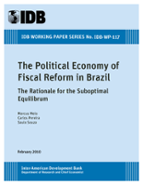The Political Economy of Fiscal Reform in Brazil: The Rationale for the Suboptimal Equilibrum
Date
Feb 2010
This project examines fiscal reforms in Brazil since the 1990s, particularly in taxation, budgeting, and fiscal federalism. While recentralizing fiscal authority and massively expanding the extractive capacity of the state, policymakers chose not to revamp an inefficient tax system that has nonetheless proven capable of generating high levels of revenue. In budgeting, the economic crises of the mid-1990s prompted the government to rein in subnational fiscal imbalances but discouraged policymakers from introducing major changes in the tax system. As the executive derives utility from fiscal stability and inflation control because of electoral incentives and credibility gains in international markets, reform initiatives can generate political benefits for incumbent politicians. The paper finally argues that the Achilles heel of the sustainability of the Fiscal Responsibility Law is its enforcement technology: the -Tribunais de Contas-.



